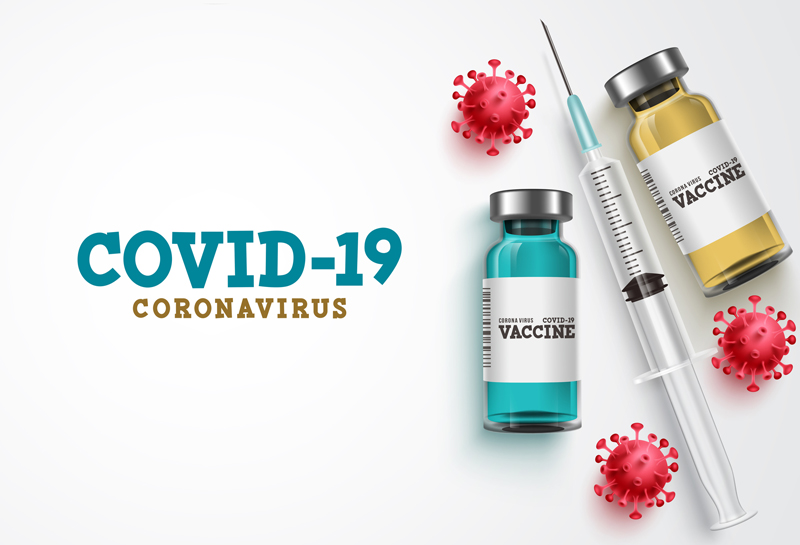What are the benefits of the COVID-19 vaccine?
In an ongoing clinical trial, the Pfizer-BioNTech COVID-19 vaccine has been shown to prevent COVID-19 following 2 doses given 3 weeks apart. The duration of protection against COVID-19 is currently unknown.
Are there possible COVID-19 vaccine side effects?
The U.S. Food and Drug Administration (FDA) and independent medical experts are working to ensure the COVID-19 vaccines are safe. No serious safety concerns have been observed in either the Pfizer BioNTech phase 3 clinical trial including more than 43,000 individuals or the Moderna Phase 3 clinical trial with 30,000 participants.
The vaccines use an mRNA vaccine technology that has been studied for decades, so while the COVID-19 vaccines themselves are new, the mRNA vaccine technology is not.
Please note: there is a remote chance that the Pfizer-BioNTech COVID-19 vaccine could cause a severe allergic reaction usually occurring within a few minutes up to one hour after receiving it. Signs of a severe allergic reaction can include:
- Difficulty breathing
- Swelling of your face and throat
- A fast heartbeat
- A bad rash all over your body
- Dizziness and weakness
These may not be all the possible side effects of the Pfizer-BioNTech COVID-19 vaccine because it’s still being studied in clinical trials. Serious and unexpected side effects could occur.
What should I do if I experience side effects?
If you experience a severe allergic reaction, call 9-1-1, or go to the nearest hospital. Call the vaccination provider or your healthcare provider if you have any side effects that bother you or do not go away.
Report vaccine side effects to FDA/CDC Vaccine Adverse Event Reporting System (VAERS). The VAERS toll-free number is 1-800-822-7967 or report online to vaers.hhs.gov/reportevent.html. Please include “Pfizer-BioNTech COVID-19 Vaccine EUA” in the first line of box #18 of the report form. In addition, you can report side effects to Pfizer Inc. with the following contact information:
pfizersafetyreporting.com | 1-800-438-1985 | Fax: 1-866-635-8337
Who will receive vaccines after first responders, doctors and nurses receive their doses?
For the most current information on Ohio’s response to COVID-19, visit coronavirus.ohio.gov or call 1-833-4-ASK-ODH.
The following timeline outlines the immediate distribution of the vaccine:
- On December 14, 2020, several healthcare workers and personnel routinely involved with the care of COVID-19 patients immediately received the first 975 vaccines between both The Ohio State University Wexner Medical Center in Columbus and UC Health in Cincinnati.
- On December 15, 2020, based on geographic location and access to ultra-cold storage, vaccine shipments were delivered to eight additional hospitals in Ohio:
- Mercy Health St. Vincent Hospital, Lucas County
- Cleveland Clinic, Cuyahoga County
- Metro Health Medical Center, Cuyahoga County
- Mercy Health Springfield Regional Medical Center, Clark County
- OhioHealth Riverside Hospital, Franklin County
- Aultman Hospital, Stark County
- OhioHealth O’Bleness Hospital, Athens County
- Genesis Hospital, Muskingum County
- On Friday, December 18, Ohio will begin providing vaccinations in five to ten nursing homes.
What issues have people who volunteered for the trial runs encountered?
According to the FDA, participants have experienced some mild to moderate side effects — mostly swelling, pain, redness at the injection site, fatigue, and sometimes fever that resolves within about 24 hours. Some people felt tired, had muscle pain, a headache, shivering, fever, stomach pain or nausea.
Who should NOT get the vaccine?
The COVID-19 vaccine is not being offered to pregnant women, children or babies. There also isn’t data on the safety of COVID-19 vaccines for breastfeeding women yet. If you have a history of allergic reactions or pre-existing health conditions, talk to your doctor before getting the vaccine. You might need to be observed for reactions and side effects a short time after getting one.
Is it necessary to wear a face shield and/or mask after having COVID-19?
You may have some natural protection or immunity from reinfection after having COVID-19. However, it isn’t clear how long that protection lasts. Because reinfection is possible and COVID-19 can cause severe medical complications, it’s recommended that people who have already had COVID-19 still get the vaccine for it.
What’s in the COVID-19 vaccine?
The Pfizer BioNTech COVID-19 vaccine includes the following ingredients: mRNA, lipids ((4-hydroxybutyl)azanediyl)bis(hexane-6,1-diyl)bis(2-hexyldecanoate), 2 [(polyethylene glycol)-2000]-N, N-ditetradecylacetamide, 1,2-Distearoyl-sn-glycero-3- phosphocholine, and cholesterol), potassium chloride, monobasic potassium phosphate, sodium chloride, dibasic sodium phosphate dihydrate, and sucrose.
- mRNA – for the spike protein of SARS-CoV-2, the virus that causes COVID-19.
- Lipids – molecules to protect the mRNA before it gets into your cells. There are four different lipids in the Pfizer vaccine (one is cholesterol), and they’re the most likely components of the vaccine to cause allergic reactions.
- Salts – the vaccine contains four salts (one is table salt). They’re used to keep the pH of the vaccine like that found in the body, so the vaccine doesn’t damage cells when administered.
- Sugar – this ingredient is the same as the one you put in your coffee. In the vaccine, it helps keep the lipids from sticking to each other or to the sides of the vaccine vial.
For more information, visit chop.edu/centers-programs/vaccine-education-center/making-vaccines/prevent-covid.
Why is COVID-19 so political?
The coronavirus has further polarized the American people with issues like face masks, voting by mail, and the immunosuppressant drug hydroxychloroquine.
Will my COVID-19 vaccination information be recorded?
The vaccination provider may include your vaccination information in your state/local jurisdiction’s Immunization Information System (IIS) or another designated system. This will ensure you receive the same vaccine when you return for the second dose. For more information about IISs, visit cdc.gov/vaccines/programs/iis/about.html.
Is there an injury compensation program if an issue arises from the vaccination process?
The Countermeasures Injury Compensation Program (CICP) is a federal program that may help pay for costs of medical care and other specific expenses of certain people who have been seriously injured by certain medicines or vaccines, including this vaccine. Generally, a claim must be submitted to the CICP within one year from the date of receiving the vaccine. To learn more about this program, visit hrsa.gov/cicp or call 1-855-266-2427.
How much of the population needs to get the COVID-19 vaccine to eradicate the virus?
Experts don’t know what percentage of people need to be vaccinated to achieve herd immunity to COVID-19. Herd immunity is a term used to describe when enough people have protection — either from previous infection or vaccination.
Can I stop taking safety precautions after getting the COVID-19 vaccine?
Experts want to learn more about the protection COVID-19 vaccines provide and how long immunity lasts before changing safety recommendations. Factors such as how many people get vaccinated and how the virus is spreading in communities will influence these recommendations. In the meantime, the Centers for Disease Control and Prevention recommends following the suggested COVID-19 virus prevention precautions like covering your mouth and nose with a mask, washing your hands often, and staying at least 6 feet away from others.
Based on the distribution plan, when and where I can get the vaccine?
It’s still too early to know. Updates will be provided as they become available.

